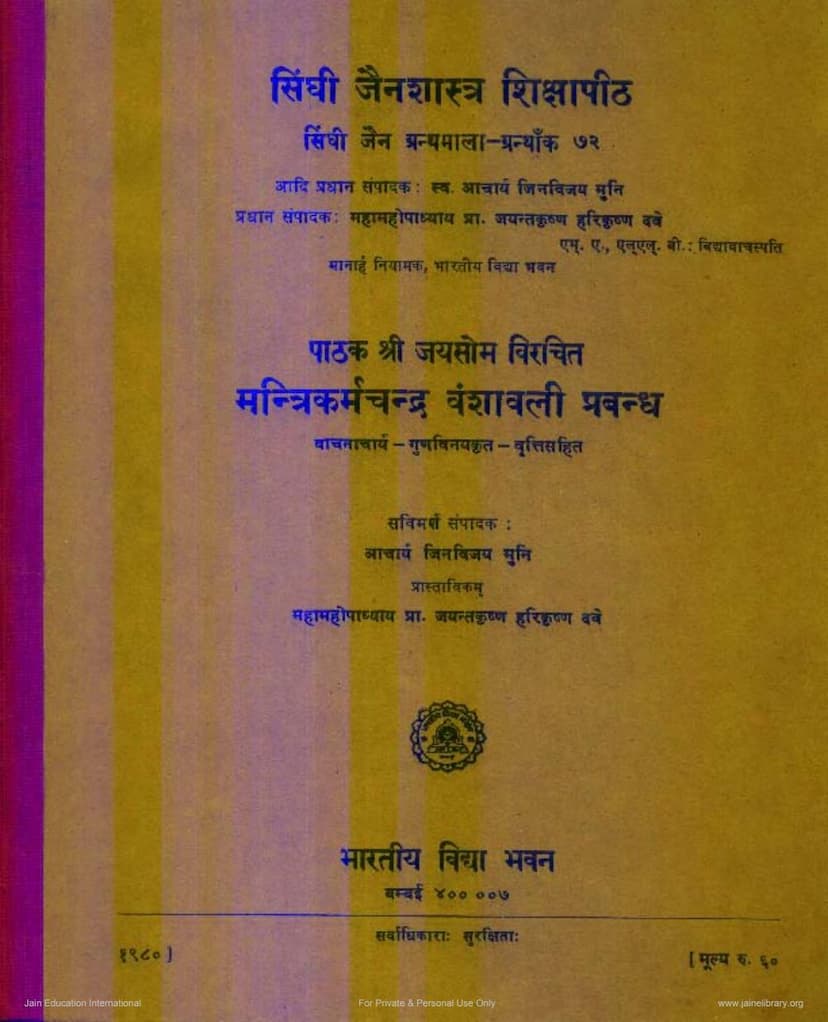Mantri Karmachand Vanshavali Prabandh
Added to library: September 2, 2025
Loading image...

Summary
The "Mantri Karmachandra Vanshavali Prabandha" is a Jain text chronicling the lineage and deeds of Minister Karmachandra of Bikaner and his ancestors. It was written by Jayasoma Pathaka and includes a commentary by Gunavinaya Vacaka. The work is critically edited by Acharya Jinavijaya Muni and was published by Bharatiya Vidya Bhavan in 1980.
Key aspects of the text and its context:
- Author and Commentary: The original text was composed in Sanskrit by Jayasoma Pathaka. Gunavijaya Vacaka provided a Sanskrit commentary on it and also created a Gujarati versified version.
- Minister Karmachandra: Karmachandra was a prominent minister during the reign of Emperor Akbar. He hailed from the Osval Vaisya community and was a descendant of Vatsaraja. He is described as an orthodox Jain, an astute statesman, and a renowned philanthropist. His influence extended throughout Rajasthan (Rajputana) and the Mughal Empire.
- Key Events and Contributions:
- Ministerial Appointment: Karmachandra was appointed minister by King Raya Kalyana of Bikaner.
- Pilgrimages: He undertook pilgrimages to important Jain holy sites like Satrunjaya and Girnar.
- Political Acumen: He played a significant role in politics, including restoring the rulership of Jodhpur to Raya Kalyana. He was instrumental in defeating armies of rivals like Ibrahim Mirza and Mohamed Husain Mirza.
- Protection of Jain Idols and Temples: He successfully protected Jain temples, notably obtaining an ordinance from Emperor Akbar to protect the Abu temples from the Mughal army's attack. He also recovered thousands of Jain idols that had been removed from Sirohi by Tursamkhan.
- Charitable Acts: Karmachandra was known for his numerous charitable deeds, including opening relief camps during a severe famine, releasing prisoners, and providing food and clothing. He also placed a golden kalasa on the Abu temple.
- Religious Devotion: He heard the recitation of the eleven Angas of the Jain scriptures from Jayasoma Upadhyaya. He also sponsored the construction of new temples at Satrunjaya and Girnar.
- Social Reforms: He advocated for and implemented measures like stopping the cutting of trees in Marwar and the killing of fish in three rivers during specific periods. He also ensured the observance of Jain parvas (religious days).
- Encounter with Akbar: Karmachandra had a significant interaction with Emperor Akbar, who honored him and asked him to introduce him to Jain scholars. This led to Akbar meeting Acharya Jinachandra Suri, who had profound philosophical discussions with the emperor.
- 'Amari' Proclamation: Following discussions with Acharya Jinachandra Suri, Akbar proclaimed "Amari" (a period of cessation from killing) across the empire, reflecting a significant Jain influence on imperial policy.
- Genealogy and Ancestors: The text details the lineage of Karmachandra, tracing his ancestry back to Vatsaraja and mentioning various ancestors and their roles. It highlights the noble and benevolent nature of his family.
- Critically Edited Version: The edition published by Bharatiya Vidya Bhavan benefits from the critical editing of Acharya Jinavijaya Muni, ensuring scholarly rigor.
- Significance of the Singhi Jain Series: The publication is part of the Singhi Jain Series, initiated with the financial support of Shri Bahadursimhaji Singhi. This series, under the editorship of Muni Jinavijaya, has gained international recognition for its contribution to Jain scholarship.
In essence, the "Mantri Karmachandra Vamsavali Prabandha" serves as a historical and biographical account of a highly influential Jain minister, showcasing his contributions to religion, statecraft, and social welfare during a significant period of Indian history, particularly under the Mughal Empire.